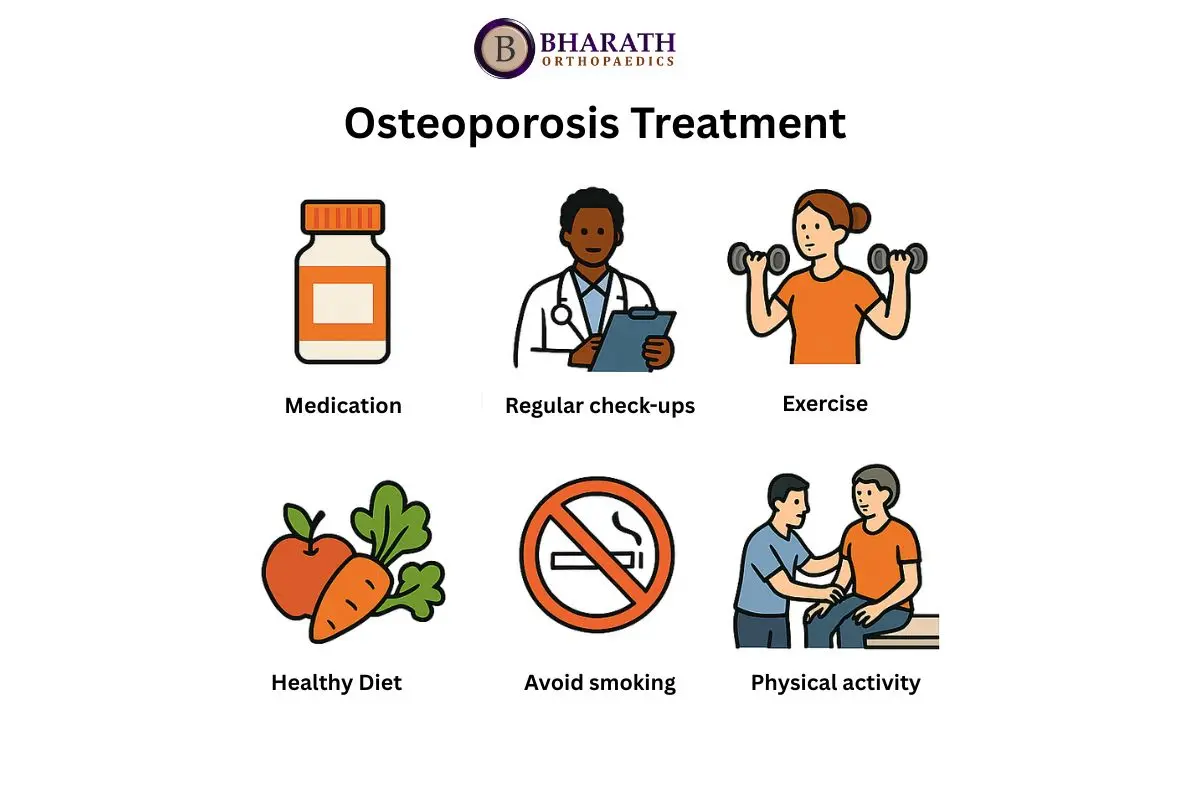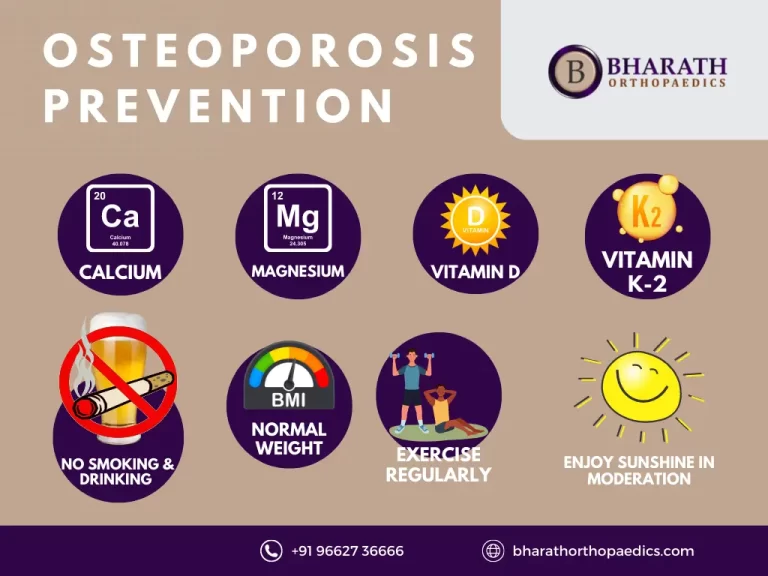Osteoporosis is a condition in which bone density gradually decreases, causing the bones to become weak, brittle, and more prone to fractures. Often known as a “silent disease,” it typically shows no clear symptoms until a sudden fall or even a small impact leads to a break. Factors such as aging, hormonal changes, and poor nutrition all contribute to its progression. Identifying osteoporosis early and following the best treatment for osteoporosis is essential for strengthening bones, lowering fracture risks, and maintaining long-term skeletal health. Choosing a comprehensive treatment plan for osteoporosis can greatly improve overall bone stability and daily quality of life.
What is Osteoporosis?
‘Osteoporosis’ is ‘porous bone’ which means you have less bone mass and strength. It is a disease to weaken bones where you will be at risk for sudden or unexpected bone fractures. The treatment for osteoporosis during the initial stage can be a bit crucial because this disease progresses often without any symptoms or pain, and can’t be detected until bones cause painful fractures in body parts like hip, wrist and spine.

Who gets Osteoporosis?
Although both osteoporosis in men and women are prone to osteoporosis, women are four times more likely to develop the disease compared to men. The two major reasons for osteoporosis in women are the process of losing bone speeds up for several years after the menopause and also the ovaries stop producing the female sex hormone oestrogen.
What are the Symptoms of Osteoporosis?
There are typically no symptoms for osteoporosis especially during the early stage of bone loss. But if you have weakened bones by osteoporosis, you might have signs and symptoms that include:
- Loss of height over time
- Bone fractures
- Shortness of breath
- Change in posture
- Back pain caused by fracture

What causes Osteoporosis?
You can get an apt treatment for osteoporosis if you identify the causes that develop the disease. Some of the causes that lead to Osteoporosis include:
Age
Over time, the bones may weaken leading to bone loss besides making the growth of new bone get slower requiring a treatment for osteoporosis.
Intake of Steroids
It can affect the production of bone reduce the amount of calcium absorbed from the gut and increase calcium loss through the kidneys.
Lack of Oestrogen
If you have an early menopause before 45 age or a hysterectomy, which leads to the best treatment for osteoporosis .
Lack of Exercise
Lack of weight-bearing exercise leads to loss of calcium from the bones and develops osteoporosis.
Poor Diet
If you don’t have enough vitamin D or calcium or if you are underweight, you need the right treatment for severe osteoporosis.
Tobacco Usage
In women, it lowers the estrogen level and causes early menopause. In men, smoking reduces testosterone activity and also weakens the bones.
Intake of Alcohol
Drinking a lot of alcohol will increase the risk of breaking a bone due to a fall requiring best treatment for osteoporosis .
Family History
Osteoporosis can develop due to inherited factors with a very rare genetic disorder like osteogenesis imperfecta to suffer fractures.
What are the Treatment for Osteoporosis?
When it comes to the best treatment for osteoporosis, doctors usually recommend therapies that help slow bone loss, improve bone strength, and reduce fracture risks. Most treatment plans include medications designed to support long-term bone health while minimizing the chances of falls and related complications.
Bisphosphonates – These are among the most commonly prescribed drugs for osteoporosis. Options such as Alendronate (Binosto, Fosamax), Risedronate (Actonel, Atelvia), Ibandronate (Boniva), and Zoledronic acid (Reclast, Zometa) help prevent bone breakdown. Although side effects are uncommon, improper usage may lead to issues like abdominal discomfort, nausea, or heartburn-like symptoms.
Denosumab – This medication is known to provide equal or better results than bisphosphonates in improving bone density. It is highly effective in lowering the likelihood of various types of fractures, making it a strong option within the best treatment for osteoporosis choices.
Hormone-related therapy – Drugs like Raloxifene can help maintain bone mass while also offering the additional benefit of reducing breast cancer risk. This therapy is especially useful for postmenopausal women.
Bone-building medications – For individuals with severe osteoporosis, stronger treatments such as Abaloparatide (Tymlos), Teriparatide (Bonsity, Forteo), and Romosozumab (Evenity) are recommended to actively stimulate new bone formation. These medications are often considered when other therapies are not sufficient.
5 Ways to Prevent Osteoporosis
Preventing osteoporosis requires lifestyle changes that strengthen bones and minimize bone loss. Here are 5 ways to prevent osteoporosis:
Effective Strategies for Osteoporosis Prevention:
- Exercise Regularly – Weight-bearing exercises, like walking, jogging, and strength training, build bone density.
- Ensure Adequate Calcium and Vitamin D – Include calcium-rich foods (milk, leafy greens) and vitamin D (sunlight, supplements) in your diet.
- Quit Smoking – Smoking accelerates bone loss, increasing the risk of fractures.
- Limit Alcohol Consumption – Excessive drinking can interfere with calcium absorption, weakening bones.
- Monitor Bone Health – Regular bone density tests help detect early signs of osteoporosis and enable timely intervention.
Incorporating these 5 ways to prevent osteoporosis can help protect your bones and ensure optimal bone health throughout life.
Treatment for Osteoporosis in Spine
Treatment for osteoporosis in spine focuses on relieving pain, improving posture, and preventing fractures. Specific treatments target the weakened spine bones to restore mobility and reduce the risk of fractures.
Effective Treatment Options for Osteoporosis in Spine:
- Medications – Bisphosphonates, hormone therapy, and selective estrogen receptor modulators (SERMs) help slow bone loss and increase bone density.
- Physical Therapy – Strengthens muscles around the spine to provide better support and reduce pain.
- Spinal Fusion Surgery – In severe cases, surgery may be necessary to stabilize fractured vertebrae.
- Vertebroplasty or Kyphoplasty – Minimally invasive procedures that restore the height of collapsed vertebrae.
Consulting a specialist for treatment for osteoporosis in spine ensures effective management and reduces complications.
When to See a Specialist
If you suspect osteoporosis or are at risk, it’s important to seek expert advice. Early intervention can help manage the condition and prevent complications.
Signs You Should See a Specialist:
- Chronic Back Pain – Persistent pain in the back, especially after a fall, can indicate spinal fractures due to osteoporosis.
- Loss of Height – A noticeable decrease in height or a stooped posture may signal vertebral fractures caused by osteoporosis.
- Frequent Fractures – If you experience frequent fractures from minor falls or accidents, it’s time to consult a specialist.
- Bone Density Test Results – If you’ve had a bone density test and your results show a low bone density, consult a doctor for further action.
Early consultation helps in the treatment for osteoporosis in spine and prevents the condition from worsening.
Conclusion
Early diagnosis and the right treatment for osteoporosis can help prevent fractures and improve bone health. A combination of medication, lifestyle changes, and a nutrient-rich diet plays a crucial role in managing the condition. Regular exercise, adequate calcium and vitamin D intake, and medical supervision are essential for maintaining strong bones and reducing the risk of complications.
Read also Best Arthritis Doctors in Chennai.
